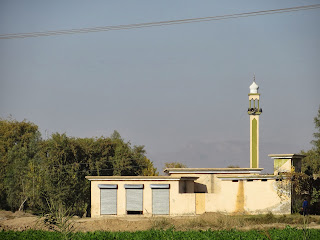Akram Khan Durrani
Akram Khan Durrani: was born in 1958 in the village Mewa Khel, Surrani, Bannu. He is the only son of Ghulam Khan. He belongs to Durri Khel clan from paternal side. He is Said Khel Wazir from his maternal side. His maternal side relatives live in Said Khel village, Surrani. He studied at Sikander Khel Bala Primary and High Schools. He completed his FA from Government Degree College, Bannu. His clan members live in Mewa Khel; Duri Khel; Allah Dodi kala (Bazida Karim Khan); Ahmad Khon kala (Bazida Yusuf Khan); and Bazidi (Bazida Kokal Khel).
He is the grandson of Khalif Gul Nawaz Khan. Khalifa Gul Nawaz was military commander of Haji Sahib (Faqir Epi). He fought many battles with British forces in Bannu and North Waziristan. After the independence of Pakistan in 1947, Gul Nawaz returned from the mountains and announced that he recognise Pakistan as an independent state. As a result he was awarded land in Mewa Khel by the Government of Pakistan.
Muhammad Akram Khan Durrani's grandfather Khalifa Gul Nawaz is first cousin of Lt General (R) Habibullah Khan (father of Lt General (R) Ali Quli Khan), Ex-Federal Minister Yousuf Khattak, Ex-Senior Federal Minister Kalsoom Saifullah (mother of Hamayun Saifullah, Salim Saifullah, Anwar Saifullah, Javed Saifullah) and Raham Jan Khan.
His uncle Saadullah Khan was also MPA from Bannu in 1985 during the premiership of Muhammad Khan Junejo under General Zia-ul-Haq. Saadullah Khan is FATHER OF DEMOCRACY in Bannu (and Lakki Marwat). He defeated the combined power of Saifullah Brothers and Malak Sher Bahadar Khan Surrani (father of Nasir Khan Ex-MNA/ Provincial Minister) and thus gave power to the poor people of this area. Before that the Khans of Bannu would stand for election and the common men had to vote for them. Even these rich people never bothered to ask for votes as they considered it as their insult to ask ordinary people.
Akram Durrani was elected as the 23rd
Chief Minister of
Pakistan's
Khyber-Pakhtunkhwa on 29 September 2002. He is one of the few chief ministers in Pakistan who spent five years and completed his tenure. He is said to have a Degree in law and is a prominent member of the Jamiat-Ulema-Islam (F) of Maulana Fazlar-Rehman as well as a prominent member of the religo-political alliance the Muttahaida-Majlis-e-Amal. In his student life he was a member of the Pakhtun Student Federations, the student wing of the
Awami National Party. Subsequently he joined the JUI-F and was elected several times to the provincial assembly from his home constituency of Bannu
[1]
He was elected to the National Assembly of Pakistan in the 11 May 2013 general elections. He also won provincial assembly seat which he relinquished. On that seat his cousin Azam Khan Durrani has been elected as MPA in the 22 August 2013 bye-elections. Akram Khan Durrani has been appointed as Federal Minister by the President of Pakistan on the advice of Prime Minister Nawaz Sharif on 29 August 2013 (The News). He has been given the portfolio of Ministry of Communications, Government of Pakistan on 30 August 2013. He has become the only Pashto speaking cabinet minister of the Government of Pakistan in the cabinet of Prime Minister Nawaz Sharif.
Daily Jang online newspaper reported on 29 November 2013 that Akram Khan Durrani is going to take oath as Federal Minister along with Abdul Ghafoor Haidri as Minister of State and a Minister from FATA in the next cabinet extension.
Akram Khan Durrani is the voice of ordinary people of Bannu and the surrounding districts and is champion of their rights. He is highly respected in all the districts of Southern Pashtunkhwa, from Kohat to Dera Ismail Khan








































